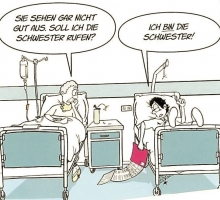Germany moves closer to safe and effective staffing for health

This represents a validation of the campaign of Ver.di for Safe and Effective Staffing for Health (SESH). The union’s Federal Councillor Sylvia Buehler welcomed this development, emphasizing that market competition cannot lead to setting such necessary standards for quality healthcare delivery. She also noted that the position now taken by the Federal Ministry was to a great extent a result of the evidence-based advocacy and numerous protest actions of Ver.di.
The union submitted a petition to government in 2015 demanding a statutory assessment of personnel needed for quality healthcare delivery. Apart from organising activities for members and government officials in Germany, it also hosted a European Federation of Public Services Unions (EPSU) workshop on Safe and Effective Staffing for Health in November 2016. At that workshop, health and social services unions from different countries in Europe as well as health ministry officials shared experiences and views on the benefits and need for legally binding minimal staffing levels.
With thoroughgoing research by experts, ver.di established a gap of 162,000 full-time positions in German hospitals, of which 70,000 are nurses. While the step by government towards addressing this gap is commendable, it is not comprehensive. Scaling up staffing levels, from the perspective of the report is to be limited to areas which the expert committee noted as being sensitive for care delivery, such as intensive care units and night shifts. But the conditions of work in hospitals in general are becoming ever more precarious with nurses and other health professionals being overworked, because of inadequate staffing levels.
Ver.di is calling for the implementation of minimal staffing levels in line with international staff-to-patient ratios for safe and effective health care delivery. PSI fully supports this demand as a pivotal point for upholding the right to health in Germany.

